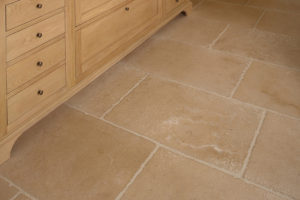Limestone Floor Cleaning Services Limestone Restoration, Care, Maintenance & Sealing
Limestone is a sedimentary rock formed from calcareous  remains of plants and animals or precipitated from solution. Often contains remains and fossils of sea creatures. It is natural Calcium Carbonate (CaCO3) and will yield lime when heated. Does not show much gaining or crystalline structure. It has a smooth granular surface unlike some of the man-made tile floors. Varies in hardness. Some dense limestone can be polished – will never be as shiny as marble or granite! Color tones are typically neutral. Call today for Limestone Floor Cleaning Services!
remains of plants and animals or precipitated from solution. Often contains remains and fossils of sea creatures. It is natural Calcium Carbonate (CaCO3) and will yield lime when heated. Does not show much gaining or crystalline structure. It has a smooth granular surface unlike some of the man-made tile floors. Varies in hardness. Some dense limestone can be polished – will never be as shiny as marble or granite! Color tones are typically neutral. Call today for Limestone Floor Cleaning Services!
Many older buildings have durable limestone flooring. This is the chalky porous type typical of most French and Spanish limestone. Etched by acids, including soft drinks. Absorbs oils and other liquids and is more easily stained than marble. Composed of Calcite and some Magnesium. Color tones are typically neutral. Limestone is becoming more popular than marble and is usually honed (not shiny). Has a smooth granular surface. Varies in hardness.
Limestone and marble are very reactive to acid solutions, making acid rain a significant problem. Many limestone statues and building surfaces have suffered severe damage due to acid rain. Acid-based cleaning chemicals can also etch limestone, which should only be cleaned with a neutral or mild alkaline-based cleaner.
Limestone is more porous, softer, and chemically sensitive than marble or granite. Etched by acids, including soft drinks and juice. Absorbs oils and other liquids and is easily stained. So putting limestone in a kitchen or heavily used bathroom is not a good idea.
Should be sealed with a penetrating sealer to prevent staining and reduce soiling. Should only be cleaned with neutral pH detergents. Because it is soft, it should never be cleaned at pressures above 800 PSI and then only if the grout is in good condition.
